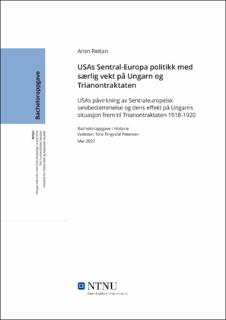| dc.contributor.advisor | Petersen, Tore Tingvold | |
| dc.contributor.author | Reitan, Aron | |
| dc.date.accessioned | 2022-07-15T17:21:54Z | |
| dc.date.available | 2022-07-15T17:21:54Z | |
| dc.date.issued | 2022 | |
| dc.identifier | no.ntnu:inspera:110289010:51868355 | |
| dc.identifier.uri | https://hdl.handle.net/11250/3005979 | |
| dc.description.abstract | Temaet for denne bacheloroppgaven er den påvirkningen USA hadde på Sentral-Europa med de fjorten punktene, og hvordan særlig Ungarn ble sterkt påvirket av den. De fjorten punktene ble først presentert den 8 januar 1918 da presidenten av USA Woodrow Wilson talte til den amerikanske kongressen og i bunn og grunn var punktene USAs krav for den kommende fredskonferansen for den pågående krigen, kjent nå som første verdenskrig. Flere av punktene viste seg å ta utgangspunkt i det samme aspektet med selvbestemmelse, noe som hadde uforutsette konsekvenser for Europa, særlig Sentral-Europa og Balkan. Ungarn i 1918 hadde nylig oppnådd sin selvstendighet da Habsburgriket falt sammen, Ungarn ville raskt befinne seg i en periode definert av invasjon og regimeskifter, samtidig som fredsavtalen gjeldende for Ungarn etter første verdenskrig skulle vise seg å være godt i gang foruten ungarsk innspill. Problemstillingen lyder slik:
Hvordan påvirket USAs fjorten punkter Sentral-Europa og da særlig Ungarn i perioden 1918-1920, og hvordan vises dette i Trianontraktaten?
For å svare på problemstillingen har jeg analysert de fjorten punktene, Ungarns situasjon i den aktuelle perioden og den etterfølgende Trianontraktaten. Ved å undersøke de fjorten punktene og senere selvbestemmelsesprinsippet har jeg vurdert hvilken påvirkningskraft det hadde på Sentral-Europa og særlig Ungarn i perioden gitt. Undersøkelsene mine viser til at de fjorten punktene var begynnelsen for USAs deltakelse i storpolitikken og at deres punkter angående selvbestemmelse hadde større ramifikasjoner for Europa enn de kunne ha forutsett. Videre viser oppgaven at selvbestemmelsesprinsippet hadde en stor og varig påvirkning for Ungarn, og at selvbestemmelse var skyldig i Ungarns uheldige situasjon og senere tap av landområder via den påtvingende fredstraktaten i dag kjent som Trianontraktaten. | |
| dc.description.abstract | The theme for this bachelor thesis is the effect the US had on Central-Europe with their fourteen points, and how especially Hungary was strongly affected by it. The fourteen points was first presented the 8th of January 1918 when the president of the US Woodrow Wilson spoke to the American congress and essentially the points where the US’s demands for the upcoming peace conference for the ongoing war, now known as World War One. Several of the points turned out to be based on the same aspect of self-determination, which had unforeseen consequences for Europe, especially Central-Europe and the Balkans. Hungary in 1918 had recently gained their independence when the Habsburg Empire collapsed, Hungary would soon be in a period defined by invasion and regime change, meanwhile the peace agreement in force for Hungary after the First World War would prove to be well underway in without Hungarian input. The thesis statement is:
How did the US’s fourteen points affect Central-Europe and especially Hungary in the period 1918-1920, and how is this shown in the Treaty of Trianon?
To answer the thesis, I have analyzed the fourteen points, the Hungarian situation in the period in question and the following Treaty of Trianon. By examining the fourteen points and later the principle of self-determination, I have assessed what influence it had on Central-Europe and especially Hungary in the period given. My research shows that the fourteen points were in the beginning of the United States’ participation in major politics and that their points regarding self-determination had greater ramifications for Europe than they could have anticipated. Furthermore, the thesis shows that the principle of self-determination had a great and lasting impact on Hungary, and that self-determination was to blame for Hungary’s unfortunate situation and later loss of land via the coercive peace treaty today know as the Treaty of Trianon. | |
| dc.language | nob | |
| dc.publisher | NTNU | |
| dc.title | USAs Sentral-Europa politikk med særlig vekt på Ungarn og Trianontraktaten | |
| dc.type | Bachelor thesis | |
